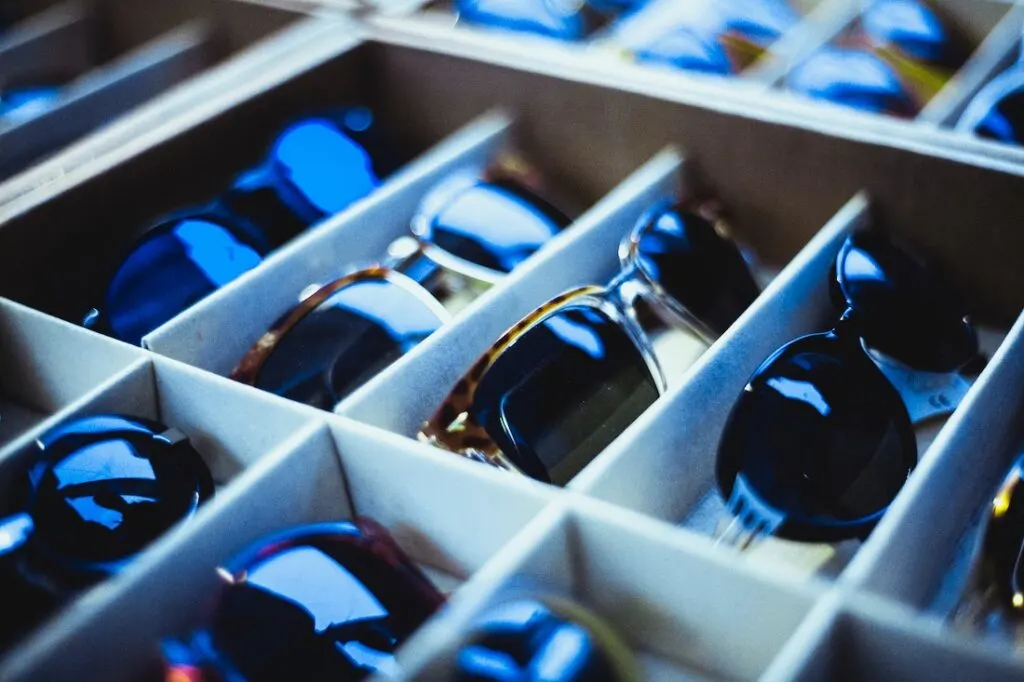When it comes to eye care, most of us think about annual check-ups, vision correction, or perhaps the occasional use of eye drops. However, one crucial aspect of eye health that often gets overlooked is how to protect the skin around your eyes from the harmful effects of the sun.

Let’s take a closer look at the world of sunglasses and the pivotal role they play in maintaining your eye health including protecting the delicate skin around your eyes.
UV Rays and Your Eyes
Ultraviolet (UV) rays from the sun can be incredibly harmful to your eyes and the sensitive skin surrounding them. One of the best ways to protect the skin around your eyes is by wearing sunglasses with polarized lenses. If you’re on the lookout for womens designer sunglasses, remember to consider sun safety alongside fashion.
Without polarized lenses, prolonged exposure to UV rays can lead to a range of eye conditions, including macular degeneration, cataracts, and even certain types of eye and eyelid cancers. But it doesn’t stop there; UV rays can also cause photokeratitis, often referred to as “sunburn of the eyes.” This painful condition can result in symptoms like temporary pain, redness, blurry vision, and light sensitivity.
The Skin Around Your Eyes: Thin and Vulnerable
The skin around our eyes is very thin and delicate, making it more susceptible to sun damage than other areas of the body. This thinness makes it easier for UV radiation to penetrate and harm the underlying tissues. Therefore, preventing sun-related damage to the skin around your eyes is not just a matter of aesthetics; it’s a crucial aspect of overall health.
Dr. Andrew Iwach — the clinical spokesperson for the American Academy of Ophthalmology — emphasizes, “It’s much easier to prevent cancer related to sun damage around the eye than it is to treat it.”
Year-Round Protection: Not Just a Summer Accessory
Sunglasses are often seen as a summer fashion statement, but their importance extends way beyond sunny beach days. UV rays can harm your eyes and the skin around them year-round. In the winter, sunglasses become essential for preventing snow blindness, a type of photokeratitis caused by UV rays reflecting off snow and ice. Even in cooler seasons, light reflecting off surfaces like sand, water, or concrete can have the same harmful effects on your eyes and skin.

How to Choose the Perfect Pair of Sunglasses
Now that we understand sunglasses’ critical role in eye care, let’s explore how to choose the perfect pair to protect the skin around your eyes.
The Must-Have: UV Protection
When shopping for sunglasses, the first and most important feature to look for is UV protection. Ensure you choose sunglasses that are labeled “100 percent UV” or “UV400.” These labels indicate that the lenses effectively block UVA and UVB rays, providing complete protection for your eyes and the skin around them.
If you can’t find UV information on the packaging, do not buy them. Remember, without UV protection, your sunglasses are merely a fashion accessory.
Finding the Right Lens Darkness
Contrary to what many people believe, the darkness of sunglass lenses doesn’t impact their UV protection, but it does influence your comfort while wearing them. Opt for medium-dark lenses for daily use as recommended by the American Academy of Ophthalmology. These strike a balance between comfort and protection.
While those with light sensitivity conditions may be tempted to go for darker lenses, it’s important to note that very dark lenses can lead to increased eye fatigue and sensitivity over time. Avoid wearing sunglasses indoors or in dimly lit areas to prevent unnecessary pupil dilation.
Lens Size Matters
The size of your sunglasses’ lenses is another important consideration, especially when maximizing protection. Larger lenses provide better coverage and offer added protection against wind, dust, and pollen.
If you’re prone to allergies, have dry eyes, or suffer from conditions like thyroid eye disease, consider opting for oversized wraparound sunglasses. These shield your eyes from UV rays and create a protective barrier against environmental irritants.

Unlocking the Benefits of Lens Polarization
While not mandatory, polarized lenses offer a valuable advantage by reducing glare from the sun and other light sources. This glare reduction can make outdoor activities like fishing, boating, skiing, and mountaineering more enjoyable and safer. Polarized lenses also help combat snow blindness and eye strain caused by reflections from water or sand.
However, remember that polarized lenses may not be ideal in some situations, such as nighttime driving or reading LCD screens. Always check for a polarized sticker on the lenses when shopping for sunglasses.
The Choice of Lens Color: A Matter of Style
Sunglass lenses come in various colors, ranging from grey and brown to red, yellow, and orange. While the lens color can significantly impact the style of your sunglasses, it doesn’t affect UV protection, polarization, or functionality. The choice of lens color is a personal preference, allowing you to express your unique style. Feel free to experiment with different colors until you find the one that suits you best.
Conclusion: Your Eyes Deserve the Best
Your eyes are precious, and so is the skin that surrounds them. Protecting them from the harmful effects of UV rays is not just a matter of health but also comfort. Whether you’re basking in the summer sun or braving the winter chill, wearing the right sunglasses can make a world of difference.
Remember the essentials: UV protection, appropriate lens darkness, lens size, polarization when needed, and your preferred lens color. By choosing the perfect pair of sunglasses, you’re making a fashion statement, safeguarding your eyes, and helping to protect the skin around your eyes.
Your eyes will thank you for it.
